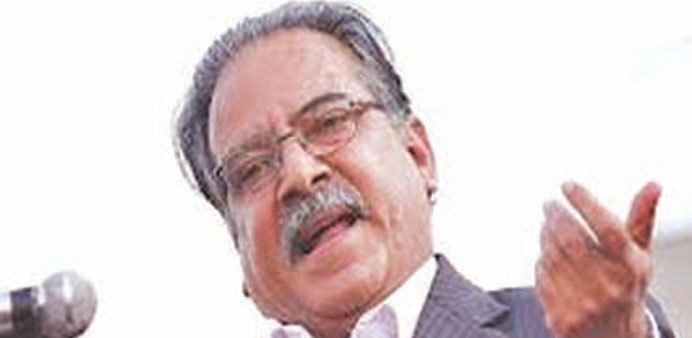IANS
The Pushpa Kamal Dahal-led Unified Communist Party of Nepal-Maoist (UCPN-M) has begun internal deliberations for rebuilding the party after its humiliating performance in the recently held constituent assembly elections, party leaders said
yesterday.
The party is holding a politburo meeting to chalk out the future political course and prepare a detailed action plan about revamping the weak organisation that led to the party’s defeat, Xinhua reported.
Party leaders have suggested the leadership to start massive campaign from grass-root level to strengthen the party’s organisational structure.
In the meeting, former prime minister and senior party leader Baburam Bhattarai has proposed to set up new organisational structure for
rebuilding the party.
“We are discussing a detail plan for strengthening the party organisation and formulating a new policy,” Maoist’s spokesperson Agni Sapkota said.
The Maoist party became Nepal’s largest party in 2008 with a landslide victory in the Constituent Assembly
elections.
But in the November 19 elections, the party performed dismally, scoring a distant third after the Nepali Congress and the Communist Party of Nepal-Unified Marxist Leninist (CPN-UML).
Party leaders said their communist ideals are fast eroding and there is a need to revive the party’s original agenda and structure.
Early this week, the UCPN-M agreed to join the country’s constituent assembly, ending a month-long political deadlock and raising hopes of long-awaited political stability in the Himalayan nation.
Senior leader Narayan Kaji Shrestha said the UCPN-M would join the body after other political parties promised to probe their claims of vote
rigging.
“We have agreed to join the assembly and help draft a constitution,” Shrestha said.
The assembly will act as a parliament as well as drafting a new charter.
The Maoists threw the country into renewed turmoil when they claimed fraud in the November 19 elections, which were seen as key to completing a peace process after the war that killed 16,000
ended in 2006.
The former rebels swept the first post-war elections in 2008, toppling the 240-year-old monarchy and transforming the kingdom into a secular republic.
But impoverished Nepal has been in disarray since then, with a string of coalition governments squabbling and failing to write a constitution. The first assembly eventually
collapsed in 2012.
The Maoists - including rebel-leader-turned-politician Pushpa Kamal Dahal have faced criticism over their apparent lavish lifestyles, a stark contrast to their revolutionary ideals.
At the November polls, the former guerrillas won just 80 out of 575 seats and came a distant third behind the Nepali Congress and Unified Marxist-Leninist (UML) parties.
Prachanda demanded a halt to vote counting and claimed fraud after results showed him losing his Kathmandu constituency, where he eventually came a distant third.
But the Maoists last Tuesday signed a deal forged with the other parties to join the assembly, after a clause on the promised probe was included.
Shrestha said they signed the agreement “for the sake of the peace process”.
“If each party remains adamant on its position, then how can we reach a deal?” he said. “Our focus now is on delivering the constitution within
a year.”

